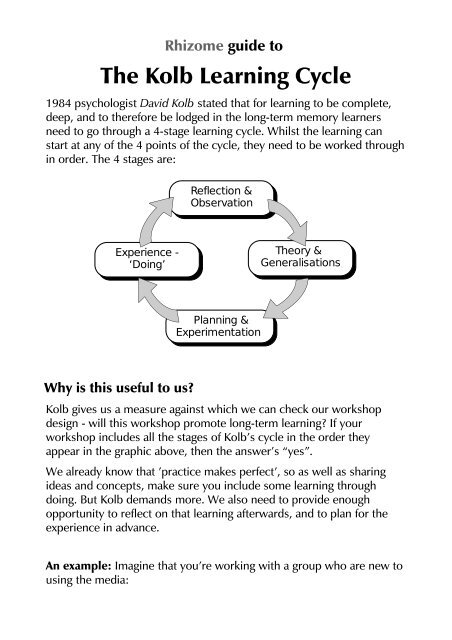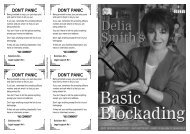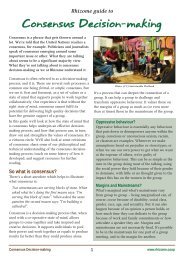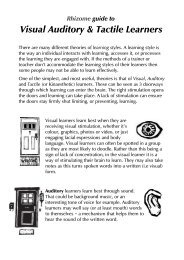The Kolb Learning Cycle - Rhizome
The Kolb Learning Cycle - Rhizome
The Kolb Learning Cycle - Rhizome
Create successful ePaper yourself
Turn your PDF publications into a flip-book with our unique Google optimized e-Paper software.
<strong>Rhizome</strong> guide to<strong>The</strong> <strong>Kolb</strong> <strong>Learning</strong> <strong>Cycle</strong>1984 psychologist David <strong>Kolb</strong> stated that for learning to be complete,deep, and to therefore be lodged in the long-term memory learnersneed to go through a 4-stage learning cycle. Whilst the learning canstart at any of the 4 points of the cycle, they need to be worked throughin order. <strong>The</strong> 4 stages are:Reflection &ObservationExperience --‘Doing’<strong>The</strong>ory &GeneralisationsPlanning &ExperimentationWhy is this useful to us?<strong>Kolb</strong> gives us a measure against which we can check our workshopdesign - will this workshop promote long-term learning? If yourworkshop includes all the stages of <strong>Kolb</strong>'s cycle in the order theyappear in the graphic above, then the answer's “yes”.We already know that 'practice makes perfect', so as well as sharingideas and concepts, make sure you include some learning throughdoing. But <strong>Kolb</strong> demands more. We also need to provide enoughopportunity to reflect on that learning afterwards, and to plan for theexperience in advance.An example: Imagine that you're working with a group who are new tousing the media:
1: You might do a series ofactivities to introduce thetheory: How does the mediawork? What information dopeople need to gather beforethey can start using the mediaeffectively? <strong>The</strong>y now have atheoretical understanding.4: Finally debriefingafter the practice androleplay can providespace for observationand reflection; Whatworked well? Whatdidn't work so well?What would you dodifferently next time?<strong>Kolb</strong> <strong>Cycle</strong>:anexample...2: <strong>The</strong>n you mightget them planning astrategy for using themedia: Who is theirtarget media, Whatwill they use as a'hook' to interest themedia? What is theirkey message?3: Next they can practicewriting a media release, followedby roleplaying a media interview,allowing them to experienceusing the media.<strong>The</strong> <strong>Kolb</strong> <strong>Cycle</strong> can start at any of the 4 stages, so it’s also possible tostart by asking your trainees to reflect on an experience that they've hadoutside of the workshop (prior learning). <strong>The</strong>n you can move throughthe rest of the cycle, drawing out theory and principles from thereflection, planning how to use this learning in future situations and ofcourse practicing. Why not start with practice? Roleplay an interview,reflect on it and use it to draw out the theory and so on. Of course youcan move through the cycle more than once – roleplay >debrief >drawout principles >plan how to apply them >then roleplay again applyingthe learning >debrief and so on!rhizome@rhizome.coop0845 458 4776This work is licensed under CreativeCommons Attribution Share-alike 2.0:UKlicense.See rhizome.coop/resources for details





